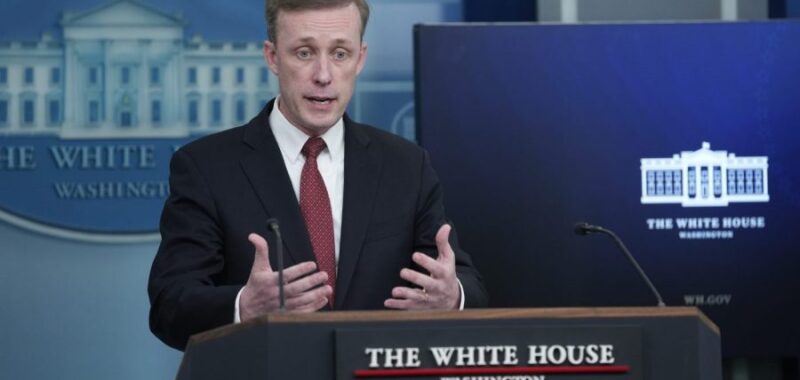
White House national security adviser Jake Sullivan will travel next week to China, where he will discuss key global issues and look to set up another meeting between President Biden and Chinese leader Xi Jinping.
Sullivan will be in Beijing from Tuesday through Thursday of next week, and he will be the first national security adviser to travel to China since 2016, according to a senior Biden administration official.
The official said Sullivan will address key topics, including tensions in the South China Sea, the war in the Middle East and China providing nonlethal technology to Russia for use in its war in Ukraine.
While the U.S.-China relationship is “intensely competitive,” the meeting will seek to responsibly manage those challenges, the official added.
“We are committed to making the investments, strengthening our alliances and taking the common sense steps on tech and national security that we need to take,” the official said. “We are committed to managing this competition responsibly [and prevent it] from veering into conflict.”
Sullivan will meet with Chinese Foreign Minister Wang Yi, director of the Communist Party foreign affairs commission office, during the trip.
In previous summits, Sullivan and Wang have laid the groundwork for Biden-Xi meetings. In this upcoming trip, Sullivan will seek to get a meeting between the two leaders later this year, according to Axios.
Biden last met Xi in November 2023 in California, a high-stakes meeting that led to the leaders agreeing to warm relations.
Following that meeting, the U.S. and China reopened military-to-military communication channels and Xi pledged to crack down harder on Chinese material used to make Fentanyl, a drug that has ravaged Americans.
Both of those topics are expected to be on the agenda for Sullivan’s trip, along with the safe development of AI technology.
“The purpose of this strategic level of communication is really to get into details on … intensive policy, how we see different situations,” the senior official said. “It really is about clearing up misperceptions and avoiding this competition from gearing into conflict, more than anything else.”
Another meeting with Xi could help advance more of those goals and would also cement Biden’s foreign policy efforts as he wraps up his final months in office following his decision to not seek reelection and back Vice President Kamala Harris as the Democrats’ presidential nominee.
Still, China and the U.S. remain at odds over major issues, including Beijing’s desire to reunify with the self-governing island nation of Taiwan, by force if necessary, and Chinese claims over the South China Sea that have led to clashes with the Philippines.
Looming over the trip is a collision this week between Chinese and Filipino boats. The incident comes after Beijing and Manila reached an agreement to allow the Philippines to resupply the crew of a beached ship on a disputed reef in the South China Sea.
The dispute over Taiwan, however, remains one of the most tense subjects. Xi has told his forces to be ready by 2027, though it is not strictly viewed as a deadline for invading.
The U.S. has unofficial relations with Taipei but remains committed to supporting the island nation, and the senior administration official described the issue as a “constant process” of dialogue.
“It requires constant conversations on both sides,” the official said. “Our view is still that direct and meaningful dialogue between Taipei and Beijing is the only way to address these issues head on.”

